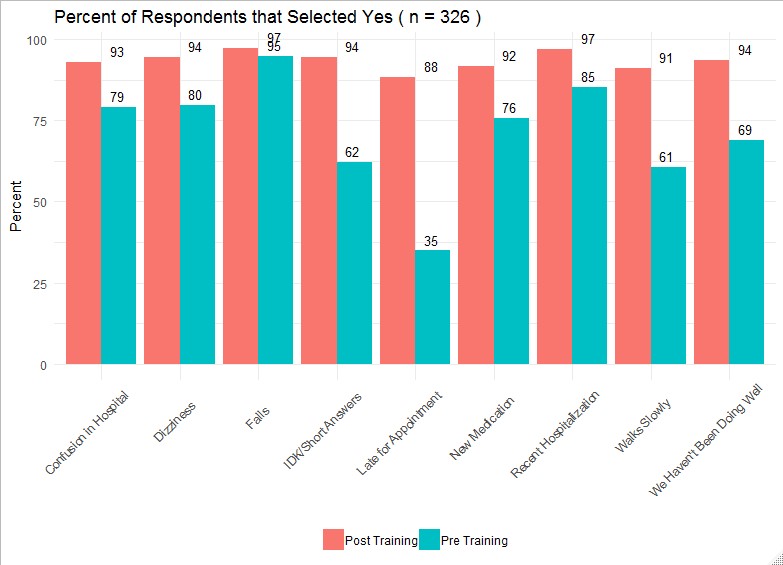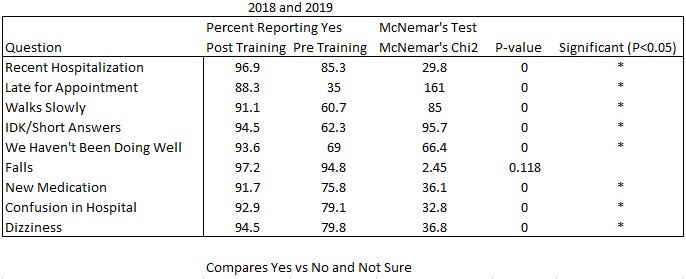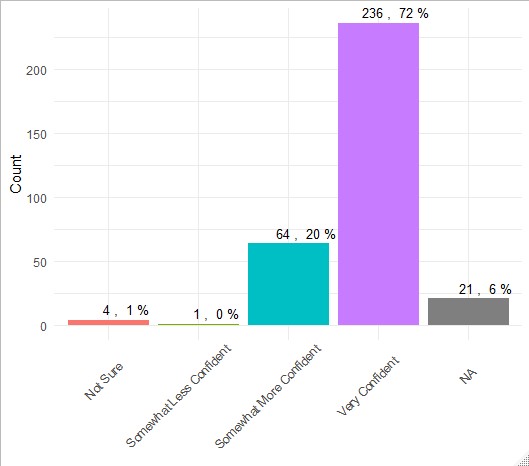RITT Overview
Menu
BACKGROUND
Mission
A well-established cornerstone of quality care for older adults is interdisciplinary teamwork. The RITT program will deliver a teambuilding curriculum for CBOC and VAMC staff, through interactive face-to-face and virtual training modalities.
Goals
The overarching goals of the workshop are to increase provider and staff knowledge and skills in geriatrics and to provide the tools for sustained team-based approaches for quality care for older Veterans. Topics include:
- Identifying team-based solutions to care
- Identification of geriatric red flags that require immediate attention when recognized
- Discussion of common geriatric conditions including; sensory impairment, falls, dementia, delirium and depression
- Overview and demonstration of cognitive screening tools
History
The Rural Interdisciplinary Team Training (RITT) Program was successfully piloted at five CBOCs across the United States between June and August 2011. Pilot sites included Rome, NY; Monterey, CA; Russellville, AR; Baraboo/Beaver Dam, WI; and Globe, AZ. A total of 68 rural healthcare providers were trained during the pilot phase with an average of 11 providers participating in the training at each site. Providers who received the RITT included physicians, nurse practitioners (NPs), registered nurses (RNs), licensed practical nurses (LPNs), social workers, pharmacists, occupational therapists, program support assistants, and other professional and paraprofessional staff.
All training participants were asked to complete a team self-assessment prior to the training, an end-of-day evaluation, a 30 day post-assessment survey, and a commitment to practice change. Participants cited changes in their practice as a result of the RITT such as: monitoring/assessing for red flags and geriatric syndromes, enhancing active listening skills, screening for fall risks, and increasing sensitivity when communicating about culture and learning impairments.
key measures & impact
As of January 2022, the RITT workshop has trained over 2,200
participants from over 250 VA Medical Centers and CBOCs.
As part of the RITT evaluation, participants are asked if they are better able to recognize 9 "Red Flags" that identify when an older adult is at immediate risk (i.e., concern needs to be evaluated and addressed on day it is discovered) as compared to before the workshop. These "Red Flags: include:
- Recent hospitalization
- Late for appointment
- Walks slowly
- "I don't know" or short answers
- "We" haven't been doing so well
- Falls
- New medications
- Confusion in hospital
- Dizziness


92% of RITT trainees reported feeling "very confident" or "somewhat more confident" about communicating to a team member that an older Veteran is at immediate risk after participating in the workshop.

Current ritt trainers
| Educator | Clinician |
|---|---|
|
|
|
|
|
|
|
|
|
|
|
|
|
|
|
|
|
|
|
|
|
New for RITT
- RITT is expanding training opportunities to include a specialized curriculum for Home Based Primary Care (HBPC) Teams. The HBPC
RITT Training has both full day and half day trainings accredited for 6.5 and
3.75 hours of CEU/CME respectfully.
- Due to the COVID-19 pandemic, RITT is now offering virtual training for 3.75 hours of CEU/CME. For more information, click here.
- GRECC Dementia Education Program (D.E.P.): The goals of D.E.P. is towfold: to provide education to the VISN 2 workforce and to support caregivers of Veterans with dementia. For more information, click here.